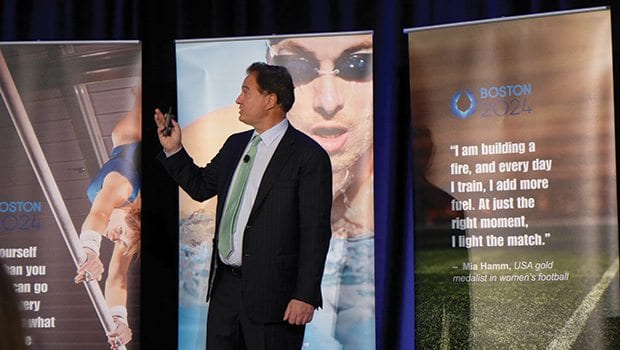Boston 2024 tries again with bid 2.0
New plan details venues, Dorchester changes

The group behind the thus-far troubled bid for the Olympic games released an updated version of its proposal Monday at a press conference held at the Boston Convention and Exhibition Center, adding more details about venues, expected costs and revenues, and long-term legacies the group said the games would leave in their wake.
The group behind the bid, Boston2024, dubbed the plan “Bid 2.0,” in contrast to what they released publicly in January, which the organization referred to as a “proof of concept” – sometimes to the chagrin of residents who said they wanted more information about what, exactly, they were being asked to sign onto.
In presenting the update, Boston2024 chairman Steve Pagliuca cast the report as the result of an exhaustive process.
“It’s not perfect, but this thing has been looked at by a lot of people,” he said, referencing the Brattle Group consulting firm that is analyzing the bid and the city’s Office of Olympic Planning, established in April and funded by Boston2024.
“We engaged with opponents – sometimes successfully, sometimes unsuccessfully,” he added, eliciting some chuckles from apparent Olympic backers in the room.
The plan includes several key updates: wide-ranging plans for the creation of new neighborhoods at Widett Circle and Columbia Point, the respective sites of the proposed stadium and athlete’s village; an expressed desire for tax breaks for the Widett developers to facilitate the stadium construction; and a call for transit improvements, including upgrades to the Red and Green lines, improvements at Broadway and JFK/UMass stations, and a reconstruction of Dorchester’s Kosciuszko Circle near the old Bayside Expo Center.
Improvements to the MBTA have long been a topic folded into Olympic discussions. When the bid was first made public in January, Boston2024 said publicly that while they would like to see improvements to the public transit system, the games would not require such projects.
On Monday, presenters sought to cast such improvements as required for commuters’ sake, whether or not the games came to Boston. Boston2024 CEO Rich Davey pointed to a slide with projected ridership trends on the MBTA in 2024, showing expected high rates of crowding, calling it the future “without the Olympic Games.”
The group has steadily been introducing new venue locations across the state over the past weeks leading up to Monday’s report release, including moving sailing from Boston Harbor to New Bedford and shooting sports from Long Island in Boston Harbor to Billerica.
Dot changes

Boston2024’s COO Erin Murphy, CEO Rich Davey, co-chair Stephen Pagliuca, and games architecht David Manfredi address the press at the release of ‘bid 2.0’.
On June 11, the group announced the selection of Harambee Park – otherwise known as Franklin Field – to host the games’ tennis events, in partnership with Sportsmen’s Tennis & Enrichment Center.
The plan includes the construction of three stadiums on the land, two of them temporary. A permanent stadium seating 2,500 people would stay behind in the wake of the games, according to current plans.
Boston2024 documents also outline other permanent updates to the park, including a dog park, a bocce court and a track.
Boston2024 spokesperson David Wedge told the Banner by email that the plans were developed through meetings with Sportsmen’s Tennis and Enrichment Center, the Boys and Girls Club, and Representative Russell Holmes. He added that members of the Franklin Field Elderly Neighborhood Association and Franklin Field Family Association had been briefed on the plans.
Wedge said the footprint of the permanent new venues would take up roughly 3.5 acres, or about 7 percent of the park, not counting the existing tennis facilities, which would be upgraded, and the existing Boys and Girls Club.
A statement from Boston2024 Chief Operating Officer Erin Murphy added, “Our current proposal would result in millions in private investment in the park, including new tennis courts, a new permanent stadium and upgrades to the park’s sprawling green space. We have been clear, however, that nothing has been finalized and there will be a robust community review process to determine how best to enhance the park and leave a lasting legacy after the Games.”
Games architect David Manfredi emphasized at the press conference that the original plans nearby Franklin Park had also changed – most notably the reversal on an earlier proposal to build a permanent pool there.
“We learned from neighbors how important Franklin Park is,” he said. “There is no proposal for any permanent facilities at Franklin Park.”
Shortly after Monday’s presentation, the Franklin Park Coalition released a statement that remained noncommittal while noting remaining concerns:
“FPC appreciate the dialogue and progress that has been made toward addressing question and concerns about the 2024 bid. That said, the Olympics stand to benefit powerful people and entities with little or no connection to the park or the surrounding community. Major sporting events in other cities have left negative legacies of financial disaster and vacant facilities afterwards. FPC needs concrete assurances that this will not be Franklin Park’s fate, given the history of chronic underinvestment and misuse. While FPC has no opinion on the Games as a whole in Boston, as the longtime advocates for Franklin Park, FPC’s membership must have a key voice in any decisions about new or high-impact activities in the park, including the Olympics. Until FPC has the opportunity to further assess Boston2024’s impact and get answers to outstanding questions, we are unable to support or oppose the Olympic proposal for Franklin Park.”
Opposition group No Boston Olympics also released a statement soon after the press conference, stating in part: “We applaud Steve Pagliuca for offering a complicated proposal on a tight deadline, but the bid makes clear in a variety of ways that Boston 2024’s masters continue to be the International Olympic Committee and the private interests that will benefit from the proposal, not the taxpayers of Massachusetts.”






